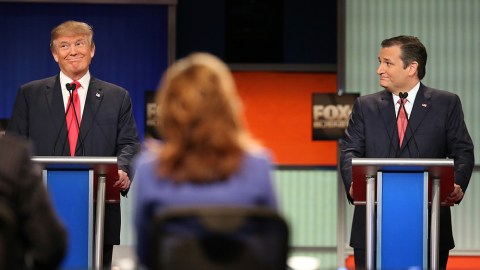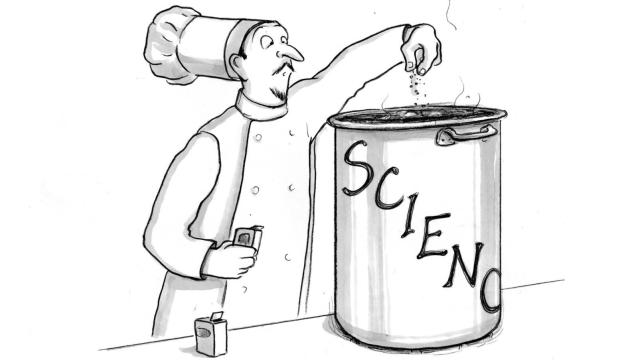The Socrates Quote That Demolishes GOP Hypocrisy on the Topic of Religious Faith

One thing that has not been lacking during the Republican debate season is God and America. For many of the candidates, separation of church and state is a misnomer, since governmental policies will always be trumped by divine mandates. He’s just waiting to unleash his love and/or fury on us, depending on what we’re discussing.
Such feelings run throughout the conservative landscape, with Justice Antonin Scalia recently laughing away the idea that atheism is protected by the Constitution. Prior to the last few GOP debates, religion has been the most discussed topic on social media, making head nods to the g-o-d mandatory during the festivities. And for the candidates that has meant, in part, denouncing his faith in others through crude jabs at their liberalism, a decidedly ungodlike trait.
Nothing is more godly than country in this brand of theological speculation. A mighty god demands a mighty army, a fact that cuts across the political divide. In his State of the Union address President Barack Obama made sure to remind citizens that America is the greatest country in the history of Earth with the greatest army ever assembled. Mixing might with religion is too seductive a notion for most politicians to pass up.
I’m reminded of Socrates by this bombastic flexing:
He is richest who is content with least, for contentment is the wealth of nature.
Thing is, American theology is about the usurping of nature, the dominance of human beings over not only all other animals, but also nature itself. This is very much the sentiment behind Republican religiosity. Thus it should come as no surprise that Americans think the Bible was written especially for them.
Yet as Russell Moore points out in The Washington Post, the notion that God is en route to make America great again has no actual bearing; he calls it “theological liberalism,” ironic given that any GOP candidate would flee from such an accusation. Then again, hypocrisy is no problem in this camp. Donald Trump’s North Korean-style pre-game show is evidence of that.
Moore cites 2 Chronicles 7:14, a rallying cry for nationalism:
If my people who are called by my name will humble themselves and pray, and seek my face, and turn from their wicked ways, then I will hear from heaven, and I will heal their land.
Apparently humbling ourselves means carpet-bombing entire cities and building a giant wall along our southern border. Never mind that the second book of Corinthians concludes with exiled Jews returning to Jerusalem. If a verse can be remixed to mean America, Americans will remix it.
Moore writes that such nationalism is not on par with biblical messaging. He relates the tendency of thinking a blessing from God equals material and social wealth, something reminiscent of prosperity theology.
The prosperity gospel teachers are drawn, after all, to passages from Deuteronomy and elsewhere promising material and physical blessing for those who are obedient, and material and physical curses for those who are disobedient. The message is that those who obey God’s word will abound with money and health, while those who disobey will face poverty and illness.
Moore is an evangelical preacher with his own agenda in regards to biblical translations. It makes sense that he would specifically call out prosperity preachers — men like Joel Osteen and Rick Warren are continually bashed by the evangelical community for their version of Christianity-lite. Yet Moore has a point: We can’t lift pieces of history and think the messages were designed specifically for us, thousands of miles and years away. They were not.
This does not imply that we cannot be inspired by ancient texts. The Socrates quote above is as relevant now as ever. Prosperity is a dream unrealized by most Americans. This story has been recirculating again, in part thanks to Bernie Sanders: 62 percent of Americans have less than $1,000 in savings. That means a good portion of both GOP and Democratic bases fall into this category.
While the distance between reality and theology remains wide, Americans will continually spot a bridge in the distance. Like every election over the last half-century, God and his desires will be shouted from the pulpit, especially, but not limited to, the GOP side. And those desires will confirm our eventual and inevitable greatness, regardless of how great a cavern we are actually staring across.
Image: Scott Olson / Getty Images





